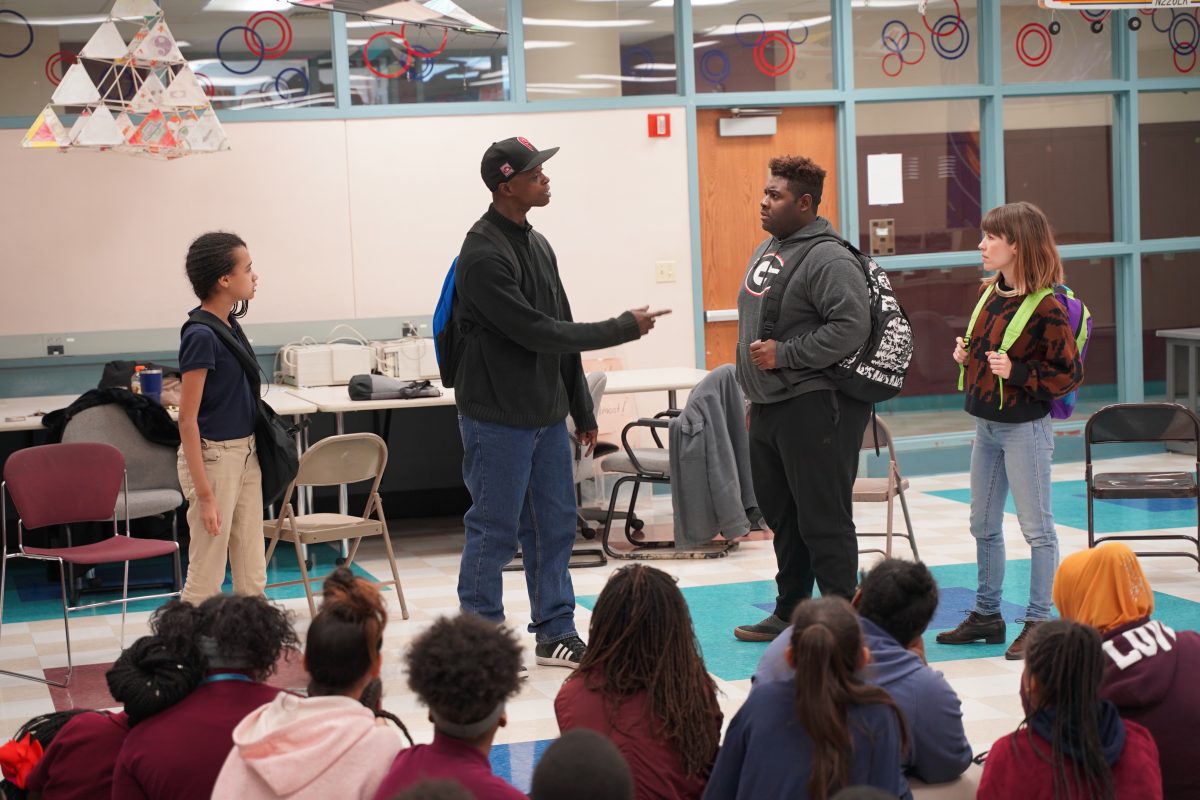
By Melissa Meinzer
At its best, theatre can provide a great deal: It entertains us, it moves us, it sustains us, it reflects us back to ourselves. But for some St. Louis school kids, it can literally save their lives.
Metro Theater Company’s “Say Something, Do Something!” program uses drama to help equip students to face difficult circumstances, from bullying to gun violence. The interactive skits encourage them to consider how to defuse tense moments or intervene when they see interactions going south.
“It’s a theatrical experience, but it’s a theatrical experience with a very specific goal,” says Metro Theater managing director Joe Gfaller. The hope is that, having walked through difficult scenarios in safe circumstances, participants might have access to the strategies later, if necessary.
Metro Theater is directed at young audiences and their families, creating access to theatre as well as the growth and development that it fosters. The company produces plays at The Grandel and takes theatre into schools. Last year, it visited 31 schools across the region.
Launched in Fall 2011, the “Say Something, Do Something!” experience involves a relatively small group of kids — usually about 60 fourth-, fifth-, and sixth-graders — and a small troupe of Metro actors, as well as a teaching artist who serves as a facilitator. The scripts and entire experience are the result of intense preparation by Metro’s production team. Before they ever take the stage at a school, they’ve conducted interviews with teachers and social workers in the schools and learned all they can about the specific conflicts that kids might be facing. They’ve also researched language, because lingo and vocabulary are ever-changing, and the scenes need to seem feasible.
“We want the language and conflict situation to feel true to life,” says Metro Theater education director Karen Weberman. “It’s what they’re actually going through. Our education is on the ground every week, in classrooms across the city and county.”
She stresses the need for deep listening to the teachers, administrators, and other school staff who know the kids best. “We don’t want this to be, ‘Here’s this program we think you need,’” she says.
Metro’s methodology for the program is backed by serious scholarship. Saint Louis University’s College for Public Health and Social Justice evaluated the program, and Weberman and SLU researchers presented the data last year at the American Public Health Association’s annual meeting in Philadelphia.
The sessions begin with a deep dive into the study of body language. Actors will freeze into a tableau, which the students can pick apart, examining characters’ motivations and feelings in a specific moment. It’s good training for what comes next — the scripted conflict. The scene is only about five minutes long, Weberman says, and while the conflict itself may vary from season to season or, to some extent, from school to school, one thing is constant: There’s a clear and obvious imbalance of power.
“When the scene comes to the highest point of conflict, the facilitator calls a freeze,” says Weberman. “The students dig into the body language of the characters. We hold up an actual thought bubble, like you might see in a cartoon.”
The students fill the bubbles with what a character — aggressor, victim, or bystander — might be thinking. Then the actors break out of the tableau but not their character, and the students take on the role of investigative reporter.
“They’re put in the hot seat, and the students get to interview them,” Weberman says. The students aren’t shy about grilling the characters, she adds. “They really go after the actor who’s playing the bully character. They want to know, ‘Why are you the way you are? Were you bullied?’”
“They want to understand the bad guy as much as they want to help the good guy,” says Gfaller.
After the interrogations, students come up with strategies for better outcomes. The actors run the scene again, and kids can tag actors out and step into the scene themselves to try the strategies.
“We like to say, ‘It’s like rehearsal for real life,’” says Weberman. “It really is all about empathy, stepping into the shoes of another.”
Previous seasons have addressed physical violence and sexual harassment — disheartening realities, Weberman says, for sixth graders. Some of the programming for the upcoming season will continue to look at violence.
During the forthcoming year, Metro Theater will also work with the Diversity Awareness Partnership, whose “Give Respect Get Respect” campaign pairs older students with local corporate executives in a mentorship program. Metro’s programming for that initiative will address gender identity issues.

